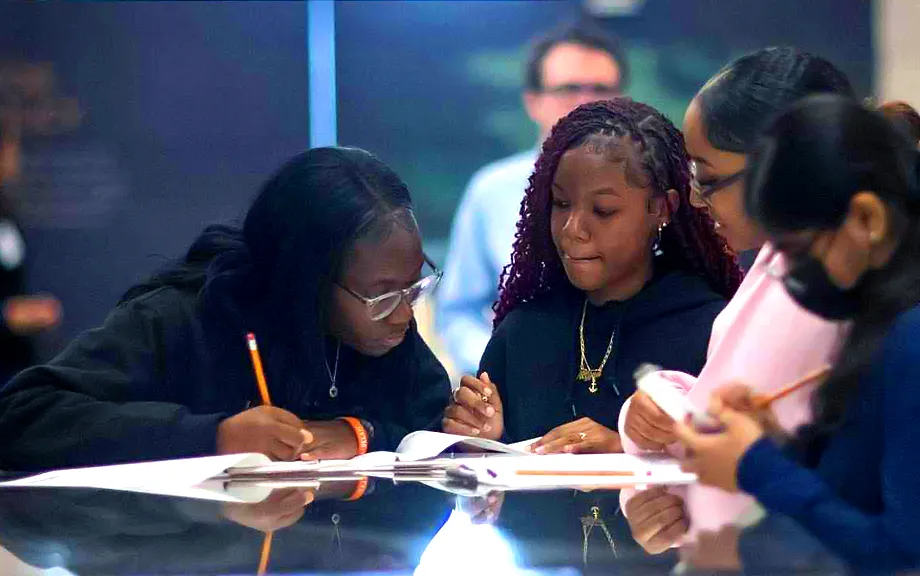Are you curious about what teachers and students think of the phone policy? I asked several teachers and two students some interesting questions about their opinions regarding this policy. Let’s start with the teachers.
I asked Mr. Trevino three questions. The first question was, “How do you feel as a teacher about the phone policy?” Mr. Trevino responded, “It has made a huge improvement in student engagement. From my own classes alone, I have noticed less distraction and significant improvements in academics.” The second question was, “If you could change the policy, would you?” Mr. Trevino said, “No, I would not change the policy. I would, however, include exceptions for specific classes that need phones for student work. For example, classes such as social media marketing or general marketing.” Lastly, the third question was, “How do you think students feel?” Mr. Trevino replied, “I am sure it is a frustrating policy. Let’s be honest, phones are a major part of our lives today, and I understand that. When it comes to policies, it’s easy to focus on the negative. However, we need to recognize the purpose of this policy; it’s not just about taking something away from you. It’s about helping you stay focused in class. This is no different from the expectations of most jobs today, where phones are not allowed while working. We, as educators, want to see every student succeed in their classes and learn. That is the driving force behind this policy.”
Mr. Callaway was also asked a few questions. The first was, “Do you see a change in students?” Mr. Callaway responded, “Yes, students are on their phones less and are more engaged in the classroom. I’ve also noticed that students talk more to each other.” The second question was, “What’s your honest opinion?” Mr. Callaway stated, “Cell phones are helpful when students are working and listening to the teacher. There should be more freedom to use phones at the teacher’s discretion. Additionally, phones are sometimes necessary for certain jobs, and students will need to use them for work.”
Those are the insights from the teachers regarding their opinions. Personally, I think teachers are often bound by their roles and thus hold these views; however, there are teachers who believe phones aren’t so bad. For example, Mr. Trevino emphasized the need for understanding on both sides, while Mr. Callaway acknowledges that some jobs require phone use, yet he also agrees with the positive changes implemented by the policy. It’s good to see he recognizes both perspectives — not that Mr. Trevino doesn’t.
Now, let’s hear from two PHS students.
Jamileth Cardenas, a PHS student, was asked a few questions. The first question was, “Do you like the school policy, and why—yes or no?” Jamileth replied, “I personally dislike the school policy. I feel that administrators and teachers often take it too seriously. I’ve seen people get their phones taken away because they were about to ring just a minute before the bell.” The next question was, “How do you think teachers feel?” Jamileth responded, “I think some teachers may agree with having the cellphone policy because they believe it helps students focus better.”
Sophie was asked, “What is your honest opinion about the phone policy?” She said, “I think it’s understandable, but at the same time, it’s a bit too much.” When asked, “What do you think teachers and staff don’t understand about the phone policy?” Sophie responded, “I think they assume that as soon as they see us take out our phones, we’re not paying attention. They also need to consider that it can take a long time to reach the school, which leaves students with no choice but to use their phones for emergencies.”
That wraps up the opinions from both students and teachers. Now, I will share my personal opinion. I have noticed that many teachers wish they didn’t have to enforce the rule, but they are required to do so by the district. This is understandable. I believe the cellphone policy stems from the school district’s desire to ensure that students pass their classes and graduate, often without considering the students’ personal lives outside of school. For example, I need my phone readily available because I receive calls from my dad’s company and must be able to respond immediately. I’m not going to ignore those calls or go to the office to use the school phone for personal matters. In my view, the policy is rather unreasonable, but perhaps it also reflects a broader objective to ensure students succeed because the government needs to produce future professionals like doctors.







